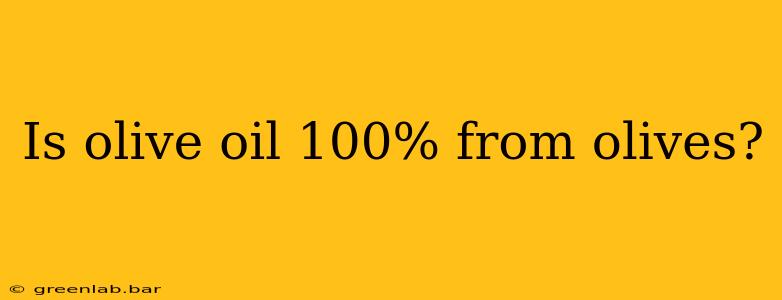The simple answer is: Ideally, yes, but it's not always that straightforward. While the vast majority of olive oil should be 100% derived from olives, navigating the world of olive oil labeling and production requires a discerning eye. This article delves into the complexities of olive oil production, clarifying what constitutes "100% olive oil" and highlighting potential areas of concern for consumers.
Understanding the Olive Oil Production Process
The journey from olive to oil is surprisingly intricate. It starts with harvesting ripe olives, which are then crushed to release their oil. This paste is then malaxed (gently mixed) to encourage oil separation. Finally, the oil is extracted, typically using either a mechanical press or a centrifuge. This process, when done correctly, yields a pure, unadulterated oil made solely from olives.
Key Factors Affecting Purity
Several factors can impact the final product's purity:
- Olive Variety: Different olive varieties yield oils with varying characteristics, including flavor profiles and acidity levels.
- Harvesting Techniques: The timing and method of harvesting significantly influence the oil's quality. Overripe or damaged olives can negatively affect the final product.
- Extraction Methods: While mechanical pressing is generally preferred for its gentler approach, centrifugation can sometimes be used, and if improperly executed, can lead to lower quality oil.
- Storage and Handling: Exposure to light, heat, and air can degrade the oil's quality and flavor over time.
Decoding Olive Oil Labels: What to Look For
Navigating olive oil labels can be tricky. Look for these key indicators:
- "100% Olive Oil" or "Pure Olive Oil": This designation means the oil is made solely from olives, without any additives or other oils.
- "Extra Virgin Olive Oil": This is the highest grade of olive oil, indicating the oil was produced solely through mechanical means, with low acidity levels (generally under 0.8%). It boasts the most intense flavor and aroma.
- Acidity Levels: Pay attention to the acidity percentage. Lower percentages generally indicate higher quality oil.
- Country of Origin: Knowing the origin can provide insights into production practices and regulations in place.
- Certifications: Look for certifications from reputable organizations that ensure quality and authenticity.
Potential Issues and Mislabeling
Despite regulations, instances of olive oil adulteration or mislabeling unfortunately occur. Some common issues include:
- Adulteration with other oils: Less expensive oils, such as sunflower or soybean oil, might be added to increase volume and reduce costs. This compromises the quality and nutritional benefits of the product.
- Mislabeling of grade: Olive oil may be incorrectly labeled as "extra virgin" when it doesn't meet the quality standards.
- Harvesting and processing issues: Poor harvesting and processing techniques can negatively impact the final product's quality and integrity even if it is 100% olive oil.
How to Choose High-Quality Olive Oil
To ensure you're purchasing authentic, high-quality olive oil, consider these tips:
- Buy from reputable brands: Research brands known for their commitment to quality and ethical sourcing.
- Check reviews: Online reviews can provide insights into consumer experiences and product quality.
- Store properly: Keep your olive oil in a cool, dark place, away from heat and direct sunlight.
- Taste test: The best way to judge the quality is through tasting. Look for a fresh, fruity flavor profile.
In conclusion: While the ideal is that olive oil is 100% derived from olives, consumer awareness and careful selection are key to ensuring you receive the high-quality product you are paying for. By understanding the production process, decoding labels, and utilizing smart shopping strategies, you can enjoy the genuine taste and benefits of pure olive oil.

